President’s Report 2021


BUILDING A BRIGHTER FUTURE





These days, higher education is not for the timid.
Universities across the commonwealth are facing daunting challenges. The number of available students is shrinking as the cost of living is growing. Public funding is not sufficient to overcome revenue shortfalls, and some people on the outside are calling into question the basic value of a college degree. Despite our illustrious history as one of the top public universities in Pennsylvania, IUP is not immune to these problems.
But we are not cowering in the face of them. Quite the opposite, really.
At IUP, we are building a brighter future for ourselves.
In this report, you’ll see a glimpse of some of the work we did in 2021 that shows what we are capable of–if we work together with a common goal. The backbone of our work is the strategic plan we adopted in 2020. It calls for us to use our resources in ways that will put our students at the center of everything we do.
What exactly does that mean?
It means we’re doing our best to make an IUP education more affordable through scholarships; to create unique learning opportunities through research; to offer academic programs that align with students and their future employers’ desires; and to ensure every student arrives here feeling safe and wanted, grows here feeling nurtured and important, and leaves here feeling accomplished and grateful.
Our strategic plan stands on three pillars: equipping students to succeed, fostering research opportunities, and sponsoring efforts to improve diversity, equity, and inclusion.
As I said, this is not a time for the timid. The challenges we face might sometimes seem like a river too wide to cross. But we are not dismayed. We have the right plan, and we know that when we work together, some truly amazing things can happen.

Turn the page and you’ll begin reading about some of them.
Michael A. Driscoll
4 10 16 22

Student Centeredness: Their Success Is Our Success
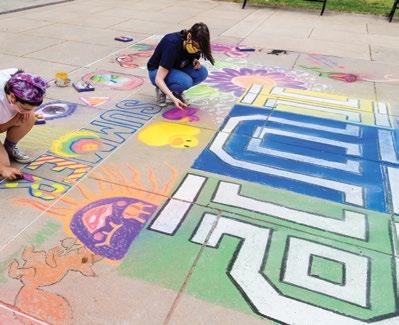
Research: Digging In to New Discoveries
DEI: Creating a Home for Everyone
Our Students’ Journey in Words and Numbers
At IUP, students come first.
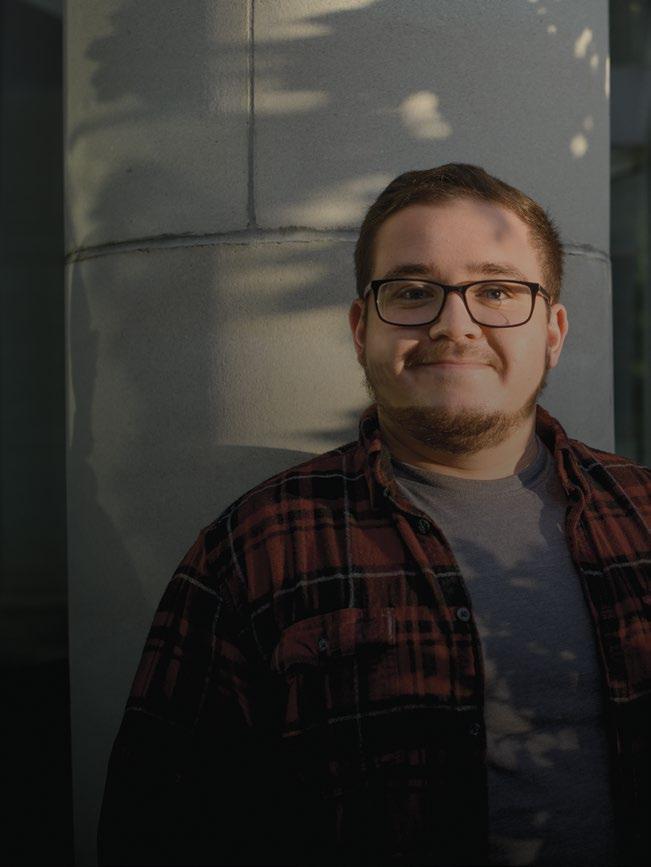
That fundamental belief is the driving force behind everything we do. We call it being a truly student-centered university, and what it means is that we use our resources to benefit all of our students so that every time they succeed–in a big way or a small way–IUP succeeds.
“Students bring their inputs, and we show them how to learn and how to better understand themselves by centering them in their work,” says Tom Segar, IUP’s vice president for Student Affairs. “We provide an environment that’s conducive to them being successful.”
Becoming a student-centered university is a goal the university adopted as part of its 2020 strategic plan. President Michael Driscoll asked all faculty, staff, and administrators to do their part to ensure every student feels safe, welcome, and productive.
“Every one of us is an ambassador for IUP, independent of our position here,” Segar says. “We’re all in it together. We’re all here for our students.”
At IUP, each student has every opportunity to be successful in and out of the classroom. Students today come to college with issues and concerns that need to be met in different ways. Making their success a priority means putting students at the center of what we do.
Many of the developments at IUP in the past few years are centered around student success. Ranging from the construction of a new building to house the Kopchick College of Natural Sciences and Mathematics to creating the University College, which helps formerly “undeclared” students explore their academic options, to instituting the Guides Program, which builds mentoring relationships between faculty or staff and new students, the needs of IUP students have been put first.
Some students come to IUP not fully equipped to handle the time demands, academic rigor, and social aspects of college. So, we work to provide them with resources to make the
journey a bit easier with such things as the Counseling Center, where they can receive mental health assistance; the Kathleen Jones White Writing Center, where they can get help with all aspects of college writing; and the Hawks Q&A Center, where they can go to have their questions about anything on campus answered.
“Our primary objective is to educate students, but we also have to meet their needs in other ways,” Segar says. “We know that what they do when they leave here depends on what they do when they’re here.”
A ROAD MAP TO SUCCESS
show that more than half of all college students change their major at least once during their academic career. While changing majors usually leads students to a program they feel fits their needs, the downside is that changing majors sometimes means graduating takes longer to accomplish.
But thanks to IUP’s University College, students like Steven Lomax can begin their academic journey and explore their options while still staying on track to graduate in a reasonable time.
While in high school, Steven, a native of Philadelphia, had planned to major in computer science in college, but he was unsure if it was the best choice for him. When he toured IUP, he learned about the University College and realized it might be a better fit.
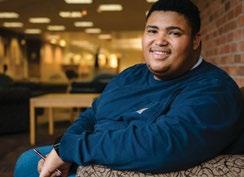
In the UC, Steven was able to dabble in several academic areas, and he found support services that made him feel like he was not alone at IUP.
Through his exploration, Steven found that he wanted to help people going through emergency situations, and he chose to major in political science, with an emphasis on homeland security.
“In the University College, I gained an understanding of the significance of support and guidance when making the transition into college,” Steven says. “By utilizing resources and peer support, I was able to explore and find what I wanted to accomplish during my time at IUP. The UC allowed me to directly invest in myself.”

Likea lot of first-year college students, Victoria Alao was intimidated when she was preparing to leave home for IUP.

A native of New Cumberland (population 7,000), Victoria was concerned about the size of the campus, the many locations she was unfamiliar with, and the number of new people she would encounter at IUP, which is about three hours west of her hometown.
But then Victoria received an email from IUP about a new yearlong program called the Crimson Scholars Circle. She learned that the CSC is designed to help first-year Black and Brown students by bringing them to campus a week early, allowing them to adapt to their new surroundings and then begin their academic journey on the right foot.
The CSC then supports them throughout the academic year with mentorship and programming. It also features a $1,000 scholarship for students who finish the year in the program.

Victoria signed up for CSC, and she is glad she did.
“I felt well-prepared, because I learned so much about the school the first week,” Victoria says. “I found my way around campus. I was told where I could go whenever I needed help. I also made some friends, which was important, because I knew that I was not going to be alone.”
The drive for student success goes beyond support services and new facilities. IUP students are also given unique opportunities to enhance their academic journey.
In the U-SOAR (Undergraduate Summer Opportunities for Applying Research) program, students can undertake research projects side by side with a faculty member to get more than a textbook education. Students can also travel abroad to continue their education in all corners of the world, giving them a truly global perspective. And with more than 250 clubs and organizations, students can meet like-minded people and find ways to make social change, improve their own lives, or learn something new.
IUP students also benefit from scholarships that help make an already affordable education less expensive. We concluded the Imagine Unlimited campaign in 2021, having raised a record-breaking $81 million from our alumni and friends that we will use to create more opportunities for our students.
Thanks to an anonymous gift, in the summer of 2021 we created the Crimson Scholars Circle program, which aims to help Black and Brown students get a head start on their first year at IUP. We bring them to campus a week early, and they learn the layout of the 374-acre campus, meet staff and administrators who are here to help them, and get assigned a student mentor who shows them
ways to be successful. If students stay in the yearlong program, they are awarded a $1,000 scholarship.
With efforts such as the Crimson Scholars Circle program, as well as the housing scholarship, in which students who choose to live on campus get $1,000 toward their college expenses, and the Student Assistance Fund, which helps students with needs relating to their work toward a degree, IUP is putting student success front and center.
Our students are getting more than a good education. They also receive the help they need and are given opportunities to create a world-class education at an affordable price. And when they graduate, they continue to be highly sought-after in the job market.
“We’re creating memories at IUP,” Segar says, “and we want our students to leave here feeling great about their decision to come to IUP. We’ve done all this because it helps students learn, but also it allows them to enjoy their time here.”
Scholarships have enabled Maura King to do more than just go to college. They’ve allowed her to dive in and get a unique experience she knows will set her up for success.
A native of East Brady, in Clarion County, Maura came to IUP because she hopes to have a career as an elementary school teacher, and education is one of the many programs for which IUP is known. But another factor was the university’s affordability.
“The scholarship opportunities, especially renewable scholarships, were at the forefront of my decision to come to IUP,” Maura says. “Of the universities I considered attending, IUP’s abundance of scholarships, along with its excellent education program, stood above and beyond the rest.”
Because of her strong academic work, Maura has received many scholarships at IUP, including the Board of Governors’ Scholarship, the Sutton Scholarship, the Academic Success Scholarship, the Jemima S. Boyd Scholarship, the IUP Scholarship, and the Professional Studies in Education Enhancement Scholarship.
Some of these scholarships are funded by generous IUP alumni and friends. They know what IUP means to them, and they want today’s students to have the same kind of IUP experience.

Well on her way to a rewarding career, Maura has used scholarships to make the most of her opportunities at IUP and to set herself up for a successful future.



After more than a decade of research and writing, Department of History Professor Emeritus Charles Cashdollar completed a comprehensive look at the history and evolution of our school, The IUP Story: Indiana University of Pennsylvania, from Normal School to University. The 440-page book, featuring an afterword by IUP President Michael Driscoll, was published in the fall of 2021 and is available for purchase at the Co-op Store.
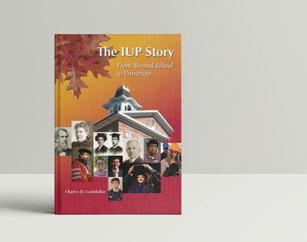

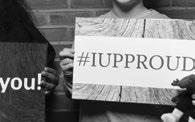

On the heels of our goal-shattering Imagine Unlimited campaign that raised $81 million for students, 152 of our family and friends showed their support for our students by donating more than $29,000 on Giving Tuesday 2021, a 24-hour fund drive on November 30. In the past four years, we have raised nearly $112,000 on Giving Tuesday, benefiting IUP students with scholarships, programming, and other life-changing opportunities.
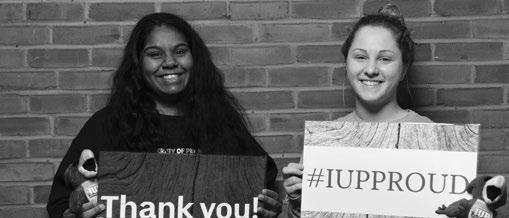
It’s why we’re here. Wonder. What if. Curiosity.
Since human beings started walking the earth, we’ve wondered what was out there, above there, and below there. We’ve questioned what would happen if we did this or if we did that, and we’ve pondered why some things happened and why other things didn’t.
We live in a world that changes day by day, maybe even minute by minute. Nothing stays the same. That’s because our curiosity has led us to do research. And through that process of questioning, probing, and testing, we gain knowledge we didn’t have before.
Here at IUP, we live for research. In our nearly 150 years as one of the state’s top institutions of higher learning, we have made it a priority. It’s what’s required of us as students of the world. Our research leads to innovation, which changes our communities, both locally and globally.
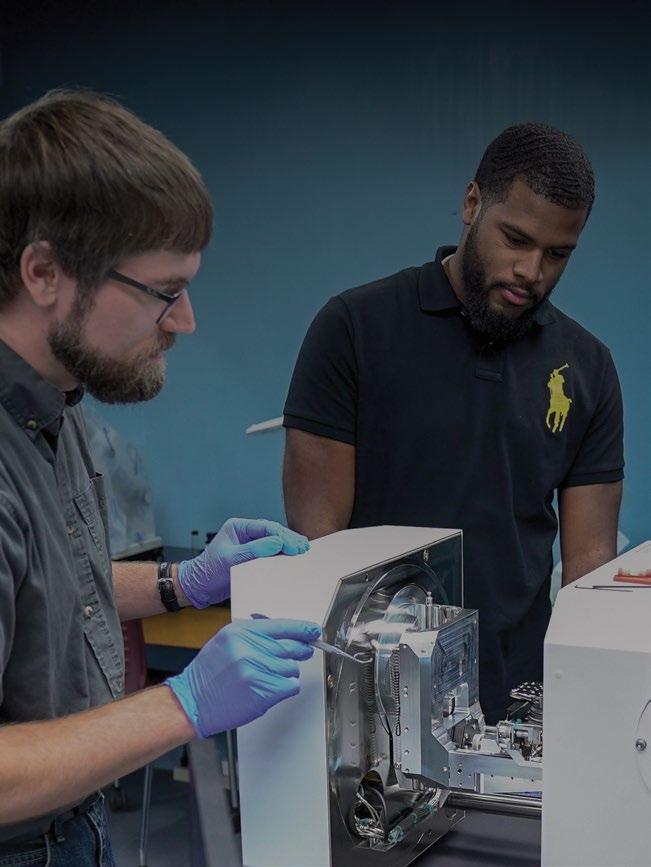
For proof of our dedication to research and reputation for it, in late 2021, IUP was designated a “High Research” doctoral university (R2) by the Carnegie Classification of Institutions. IUP is one of only five universities in the state–and one of 99 public universities in the nation–to earn this distinction.
“Research is important to advance our knowledge as a species in all disciplines,” says Hilliary Creely, dean of IUP’s School of Graduate Studies and Research.
“It’s how we grow. It’s how we solve real-world problems and help identify solutions that impact communities where we live and work. That is how we take information and translate it into useful information.”
As part of our rich tradition of research and learning, students and faculty work side by side to make discoveries every single day. It happens in the laboratories, in the classrooms, in the field, and in many other places. It obviously happens in the STEM fields but also in business, the humanities, social sciences, allied health, and nearly every other corner of the university.
“Often, when we say research, people immediately think about people in a lab with test tubes,” Creely says, “but it can be in every academic area. The definition of research, by the Council on Undergraduate Research, is original knowledge production in any academic discipline.”
At IUP, research is done not just for the sake of knowing. It’s great to discover something, but what makes it truly impactful is when that research is used to address a problem or an inefficiency in our communities.
“In high school, you usually do research by following the instructions in a textbook,”
Research may not always involve test tubes or microscopes. But it always can lead to a practical application.
Connor Daley, a political science major from North Huntingdon, signed up for the Undergraduate Summer Opportunities for Applying Research (U-SOAR) program in 2021. Teaming with faculty member Terilyn Huntington, he researched “American Political Polarization in an Age of Terror,” in which he examined the fracture created by the 2000 United States presidential election, one he believes still exists in our country.
Connor waded through various information sources to follow the effects of the election.
“The project helps to explain how the election created a fissure in American politics,” Huntington says. “In the midst of this polarization, the 9/11 attacks signaled a shortlived period of unification and agreement in American political culture.
“Connor is researching how the decisions of presidential administrations during the Global War on Terror, and the public response to those decisions, have resulted in the current political polarization that he sees.”
Connor’s project could be useful to many people working in the political science field.
“Research in political science influences policymakers,” Huntington says. “Political scientists are often called upon to serve in consulting positions and leadership roles in government. Their research is used to brief Congress about the effects of particular policies and also helps to inform journalists, reaching a more popular audience.”


Oneof the biggest benefits of joining the Undergraduate Summer Opportunities for Applying Research (U-SOAR) program at IUP is that it takes the traditional faculty-student relationship and refashions it as peer-to-peer.
Students get to conduct research projects while getting all the guidance and attention they need from a faculty member, and that relationship helps them do research and make breakthroughs that can change the world.
Although Abra Dadum, a chemistry major from Pittsburgh, learned a lot in her summer in U-SOAR as she worked on her research project, “Selective Oxidation of Alcohols in the Presence of Amines,” she says one of the best parts was working with her faculty mentor, Justin Fair.
“He has been a wonderful mentor throughout the course of my research,” Abra says. “He has provided me many additional resources, insightful input on my work, and an undying guidance. Dr. Fair has challenged me to expand both my chemical knowledge and my critical thinking skills.”
Abra hasn’t yet earned her bachelor’s degree, but she’s already been accepted into two PhD programs, both of which come with free tuition and a large stipend.
But Fair says it’s only the beginning for one of his star pupils.
“Abra is motivated, dedicated, driven, and ambitious,” he says. “She has a desire to learn, and she understands that the more time, energy, and understanding she puts in, the more doors will open for her in the future.”
Creely says. “But here, what we try to do is undertake research projects that are focused on solving real-world problems.”

At many universities across the country, students don’t often do research until they reach a graduate program. But at IUP, undergraduate students work with faculty and graduate students on many projects, and that research elevates their education and helps equip them for the workforce or graduate school.
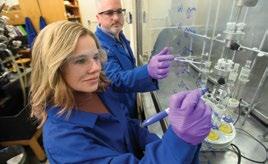
IUP faculty come from all over the globe knowing they will have opportunities to further their expertise–so they can share it with others. Through our Research Institute,
we apply for and are consistently awarded millions of dollars in grants every year, allowing our faculty members to follow leads, develop hypotheses, and test their theories.
In the 2020-21 school year, we were awarded almost $9 million for research projects that could lead students and faculty members to make breakthroughs in many subjects.
Many of our faculty have made impactful discoveries, whether they be in dinosaur fossils, safety measures, or mysteries of the mind. They have made IUP a name known around the world as a center of innovation and discovery, due in large part to our passion for research.
Our students benefit greatly from our faculty. Rather than only lecture in front of a classroom, our faculty members roll up their sleeves and dig in with their students, showing them what they have found rather than just telling them. They tell, but they also show.
It’s a two-way street. Students also make discoveries, living up to the promise passed on to them when they first came to IUP and stepped in the legendary Oak Grove with wide wonderment.
Through programs such as U-SOAR (Undergraduate Summer Opportunities for Applying Research), students can work one-on-one with a faculty member on a project of their choosing.
They learn things that they didn’t know before and, in some cases, that the world never knew before. IUP students have opportunities to share their research every year at events like the Scholars Forum, where they display posters and make presentations to reveal the fruits of their research labor, all guided by faculty members whose passion for research shows in the students they influence every single day.
Research is encouraged in every part of IUP. We take it seriously, and we do it well. Our students learn, our faculty members shine, and our world benefits—all from research.
It’s why we’re here.
Researchon its own can be worthwhile. But if it has a practical use that benefits a community, it’s even better. Some of the students in IUP’s clinical psychology doctoral program can attest to that.
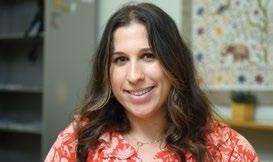
Under the guidance of faculty member David LaPorte, several of the graduate students have been working in medical offices in the surrounding areas to provide mental health treatments to patients who are
The students are assigned to local physicians who, when meeting with patients and seeing a need for mental health assistance, let the student step in and


In December 2021, Pennsylvania Governor Tom Wolf announced IUP would receive $30,000 as part of the “It’s On Us” initiative to combat sexual assault on college campuses. This is the fifth time since 2016 that IUP has received program funding that is used to help improve response to and support victims of sexual assault, as well as prevent it through programming and trainings.
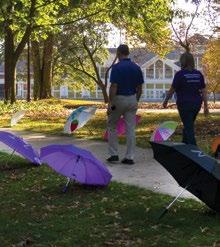



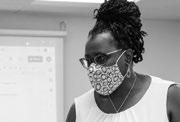
To better help cadets at IUP’s Criminal Justice Training Center see all sides of policing, faculty member Veronica Watson created an initiative, Humanities Training in Law Enforcement, which introduces books from a Black perspective as the basis for discussions about race, fairness, and policing practices. Watson’s goal is to show how law enforcement officers can do their jobs with more “equity, fairness, and respect for the individual.”
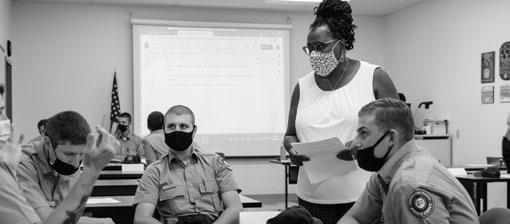
At IUP, we work to ensure that every person–regardless of race, ethnicity, identity, socioeconomic background, age, or any other identifier–is cared for and given opportunities to be successful. In every part of our university, the people of IUP are striving to make diversity, equity, and inclusion just as much a part of our tradition as Homecoming and the Oak Grove.

IUP is a microcosm of the world around us. Our vibrant campus boasts people of all races, religions, and sexual identities, and we come from all over the globe to teach, learn, and work side by side. But because the world around us can sometimes be ugly and divisive, it is imperative for us to create a campus community where everybody feels safe and valued.
A united campus will pull us through hard times and push us toward greatness. But to be united, we need to hear all points of view. We cherish our right to free speech, and we want all of us to feel that our voices can be heard.
We welcome discussions from opposing sides of the political spectrum, because it’s through interpersonal communication that we learn about each other and grow as a community.
But that is not a destination we have arrived at. It is a journey we are on.
“IUP has been a place, for more than a hundred years, where people can go and figure out who they are,” says Elise Glenn, IUP’s chief diversity and inclusion officer and Title IX coordinator. “We give people opportunities to grow and change and be exposed to broader ideas and different people. We are trying to raise the bar for the entire campus community about how we talk about diversity, equity, and inclusion.”
This is not lip service. We know that becoming the university community we aspire to be requires action, and we are taking that directive seriously.
We have created programming to help students connect with their peers who have different backgrounds than their own. We have brought speakers to campus to help guide our work with their expertise. We encourage each other to share experiences to open the eyes and minds of people who have never walked in our shoes–or we in theirs.
One of the more surprising events has been the spread of a book across all levels of the
TAKING A STAND
Gabriella Giese wanted more than a typical college experience of lectures, textbooks, and exams. She wanted to find a way to make a difference.
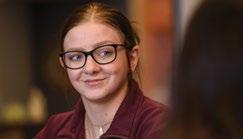
She found what she was looking for when she joined IUP Students Against Racism (SAR), an organization that empowers students to take a stand against racism, bigotry, and other forms of hatred in our world. The group holds regular meetings and discusses topics so that the challenges racial minority groups face are brought front and center. As president, she is in position to develop leadership skills while being an active member of SAR.
“Seeing IUP students from different backgrounds come together to have the difficult conversations and to fight racial injustice is a beautiful sight,” she says. “It’s what SAR is all about.”
university. Glenn and IUP Chief Marketing Officer Chris Noah realized they were reading So You Want to Talk about Race, by Ijeoma Oluo, at the same time last year, and they found it to be so insightful that they started sharing its lessons with their peers.
Soon, President Michael Driscoll was encouraging members of his cabinet to read it, and that turned into a groundswell where faculty members were reading and talking about the book with their students, who in turn began sharing experiences that have shaped their view of those around them.
A biology education major with a minor in chemistry, Gabriella plans to become a high school teacher after graduation.
“Being involved with SAR has given my IUP education a new meaning,” she says. “I have learned many things in my classes, but SAR has also provided me with skills including leadership, benevolence, and the ability to step out of my comfort zone so that I can be the best version of myself, which will benefit my students in the future.”

Duringher time at IUP, Kiara Williams hasn’t always felt at home.
It’s an experience similar to what many people around the world deal with every day. Racism and social injustice happen everywhere, and at IUP there have been times when Black and Brown students have felt marginalized.

But by attending a program in October that brought together Black IUP alumni and current students, Kiara was able to express her concerns, hear about the experiences of her predecessors, and meet some IUP faculty and administrators who were there to listen and offer support.
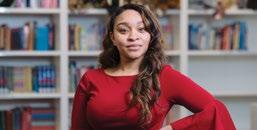
The event, called a Fireside Chat with the IUP Black Experience Alumni Committee, was held at the Center for Multicultural Student Leadership and Engagement over Homecoming weekend.
“It’s important, because it gives us people to connect with, not just for opportunities in the workplace, but also a place for our voice to be heard and understood,” Kiara says. “It also shows us that our alumni care and want us to be successful.”
The BEAC was formed in 2021 as a way for Black IUP alumni to be a source of advice and networking for current students. The committee set up events in Philadelphia and Pittsburgh for students to interact with alumni, as well as several other events to bridge the generations.
Kiara, a native of Washington, Pennsylvania, says she gained a lot from the BEAC programming.
“Events like the fireside chat also made me a strong student leader for my organization,” she says. “I can point our members in the direction of the proper university staff members to talk to when they need assistance. I’m also able to share with them things the university is doing and ways we all can become academically and emotionally successful.”
“We had listening groups and study groups that read the book,” Glenn said. “We met with the author, and a lot of students and faculty came together to hear her insights. We have been learning about what it means to confront racism in our community, and we see how we can act to make IUP the university we want it to be.”
There have also been institutional changes to put DEI efforts front and center. In the past, ugly incidents have brought negative attention to our university, and while we have stressed that these incidents were not indicative of what IUP is all about, we knew we needed to act–and that means being both reactive and proactive.
Glenn and her staff have installed a system in which any person who experiences racism or sexism or any -ism that separates us can report it, knowing action will be taken. Prior to this, incidents were brought to light and usually dealt with privately, leaving those affected feeling unsupported. But now there is a system, and campus groups take on different supporting roles, ranging from comforting the victim, to talking with the aggressor, to holding community dialogues, to keeping the university police in the loop.
“Because this is America, we get to say what we want, in certain contexts,” Glenn says. “But our goal as a university is to be a place where if an incident happens, it’s viewed as an outlying instance. If we have a campus where everyone supports each other and cares about each other, then those incidents will be anomalies.”
To be proactive, we are striving to empower our students to understand the roots of hatred so they can take ownership of their university and join in the journey to equality.
FINDING A SAFE HAVEN
Feelingsafe and cared for is critical to academic growth and success in college. Just ask Liv/Ollie Martin.
A Spanish education major, Martin identifies as genderfluid. Some days she feels more feminine (Liv), and other days he feels more masculine (Ollie), and how she feels has an impact on everything in her day.
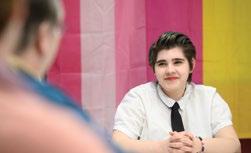
Growing up in Youngwood, Pennsylvania, Martin sometimes felt unsafe or unwelcomed. You can imagine Liv/Ollie’s sense of relief when she came to IUP and saw the huge pride flag that hangs in front of IUP’s Center for Multicultural Student Leadership and Engagement. The flag is a symbol of support and unity for all members of the LGBTQIA+ community, and its colors reflect society’s diversity and the spectrum of human sexuality and gender.
“Seeing the progressive pride flag flying is a far cry from the homophobia I experienced in my hometown,” Martin says, “so I love knowing that there is a space where I can be authentically myself without any persecution.”

Our work has gained us positive attention. In fact, some of our sister schools in Pennsylvania’s State System of Higher Education have reviewed our protocols and have installed them at their campuses. It is clear IUP is helping lead the charge to create a world where equality is the status and not the goal.
“Young people today see themselves as people with complex identities, which is what we all are,” Glenn says. “We see ourselves as valuable members of the IUP family and the State System. We believe that the better we all see and understand each other, the better off we are.”
That’s part of the reason she knows IUP was the right choice for her. It’s not just the diverse populations that enrich the campus; it’s also the campus itself, which Martin has found to be a safe haven.
“Having a specific safe space on campus for LGBTQIA+ students, being allowed to display pride flags in the Oak Grove for Coming Out Week, and other small demonstrations of support go beyond what I would expect,” Liv/Ollie says. “I know that I am not simply accepted at IUP, but welcomed when I walk around on campus.”

IUP was honored in 2021 for helping military members and their families pursue an education. Victory Media gave IUP a Gold Designation in its 2021 Military Friendly Schools rankings. Only 162 colleges and universities in the country–and six in the state–were given the status. And for the eighth year in a row, IUP was selected as a “Best for Vets” university by Military Times.

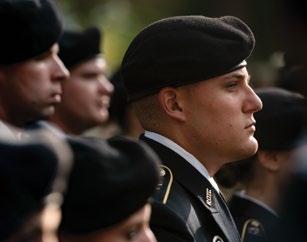



Construction continued in 2021 on John J. and Char Kopchick Hall, the $90 million, 142,000-square-foot, state-of-the-art building. When it opens in 2023, it will be the new home of the Kopchick College of Natural Sciences and Mathematics. It will feature high-tech classrooms and labs and serve as a hub of shared discovery for IUP students and faculty, as well as scientists and mathematicians across the region.
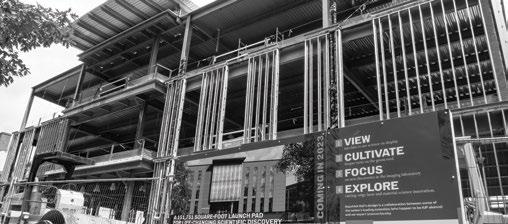
Our students come from places far and wide.
International Students: 395 Out-of-State Students: 612
They enroll in programs that empower them to improve their own lives and the lives of others here in Pennsylvania and around the world.
Pennsylvania Students: 8,301
Undergraduate: 7,044 Master’s: 1,186

Vocational: 299
The number of high school students in the
PhD and Other Doctoral Programs: 779

A total of $18M+ Entailing $11M+
In 2020-21, separate from state and federal aid awards, IUP eased the financial burden for students.
and $6M+
in university scholarships and assistantships in scholarship awards from the Foundation for IUP, reflecting generosity from alumni and friends.
2,400
out-ofclassroom experiences completed in 2020-21
expended in research and innovation–and students assisted with much of it.
IUP Guides are mentoring 2,415 students.
Each incoming freshman is assigned a staff or faculty guide who can answer questions, provide guidance, or just lend an ear. No topic is off limits.
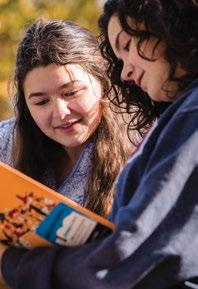
IUP is 1 of 99 public universities in the country
to be given a High Research designation by the Center for Postsecondary Research.
2,652
Total Graduates, 2020-21
and are #IUPproud when they take their first steps after graduation.
Near the end of 2021, IUP was notified that it had been selected for an R2 ranking by the Center for Postsecondary Research’s 2021 Carnegie Classification. This ranking reflects IUP’s commitment to, and success in, academic research. IUP is one of just two public universities in the commonwealth to earn this distinction.
PhD and Other Doctoral Degrees: 117
bachelor’s: 1,772
85% 87% are employed in field of choice are productive, meaning they are working, serving in the military, attending graduate or professional school, etc.

We challenge students to work hard, but we support them at the same time:
Samuel Smith, chair

Mark Holman ’79, vice chair
Laurie Kuzneski ’93, treasurer
Joyce Fairman ’76, M’84, secretary
Jennifer Baker ’05
Timothy Cejka ’73
Susan Delaney ’64

Maura King (student trustee)
David Osikowicz
Nathan Spade ’01
Anne White
Tim Moerland (retired), provost and vice president for Academic Affairs
Lara Luetkehans, interim provost and vice president for Academic Affairs
Debra Fitzsimons, vice president for Administration and Finance
Thomas Segar, vice president for Student Affairs
Patricia McCarthy ’89, D’15, vice president for Enrollment Management
Khatmeh Osseiran-Hanna, vice president for University Advancement
Chris Noah, chief marketing officer
Hilliary Creely, dean, School of Graduate Studies and Research
Elise Glenn, chief diversity and inclusion officer and Title IX coordinator
Barbara Moore ’84 (retired), executive director, Institutional Research, Planning, and Assessment
Chris Kitas, executive director, Institutional Research, Planning, and Assessment
Ruffina Winters, executive assistant to the president
Yaw Asamoah, University College and IUP Libraries
Hilliary Creely, School of Graduate Studies and Research
Sylvia Gaiko, College of Health and Human Services
Sue Rieg ’81, M’82, College of Education and Communications (interim)
Prashanth Bharadwaj, Eberly College of Business (interim)
Curtis Scheib ’77, M’78, College of Arts and Humanities
Deanne Snavely (retired), Kopchick College of Natural Sciences and Mathematics
Steve Hovan, Kopchick College of Natural Sciences and Mathematics (interim)